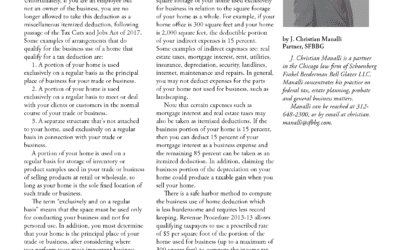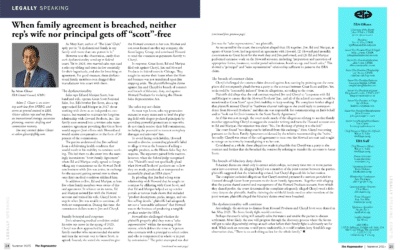Question: My mother is terminally ill and holds a meaningful amount of property, including traditional Individual Retirement Accounts. Is there a basis step-up at her death on her IRAs and on any of my appreciated assets I may choose to transfer to her?
Answer: Generally speaking, upon a taxpayer’s death, the basis of the decedent’s property for income tax purposes is the fair market value of the property as of the date of death. Because property generally increases in value over time, the concept of reflecting the new tax basis of a decedent’s assets is often referred to as a step-up in basis. That being said, in some cases the value of a decedent’s property may be less than the decedent’s basis in the property and there could be a step-down in basis on the decedent’s death. While there will generally be a basis step-up on your mother’s property at her death, you should be mindful of some exceptions to the the basis step-up rule.
The starting point is understanding the meaning of a taxpayer’s basis. A property’s basis in the hands of a taxpayer is generally what the taxpayer paid for the property. The basis of certain types of property adjusts from time to time. In the case of real estate, for example, tax basis is the amount paid to acquire the property and is increased by any capital expenditures subsequently made to the property by the taxpayer and decreased by any depreciation allowable to the taxpayer for income tax purposes and further adjusted by other items.
With respect to stock, if a taxpayer personally purchased a stock position for $10,000 during lifetime and the stock is worth $15,000 as of the date of the taxpayer’s death, the basis of the property in the hands of the decedent’s estate becomes $15,000. Had the taxpayer sold the stock immediately before death, the taxpayer would have been required to report as income and pay tax on the $5,000 of gain that was recognized at the time of the sale. If instead, the taxpayer owned the stock at death, the new basis becomes $15,000 and the $5,000 of appreciation will not be subject to income tax upon a post-mortem sale.
Not all property qualifies for a basis step-up on a taxpayer’s death. Property which would be subject to income tax to the decedent during his or her lifetime had the decedent received the same before death, known as “income in respect of a decedent”, is not eligible for a basis adjustment at death. Distributions of assets in an Individual Retirement Account or 401(k) plan, for example, which would be subject to income tax had the decedent received distributions from these accounts during lifetime are not eligible for a step-up in basis. So, generally speaking, if you are a beneficiary of your mother’s IRA, you will be taxed on IRA withdrawals taken from her accounts after death, the basis-step up rule notwithstanding.
A step-up in basis is also denied for assets held by a decedent which were gifted to the decedent within one year of the decedent’s death and transferred back to the donor upon the decedent’s death. Property so gifted and which is held by a decedent for more than one year after it is transferred back to the donor on death will be eligible for a step-up in basis. While this perhaps may be somewhat of a sensitive issue to consider, you may have to contemplate your mother’s mortality to determine if it makes sense to gift property to her for purposes of obtaining a basis step-up upon her death and then receiving back from her estate the same property with a higher tax basis.
Note that the denial of a step-up in basis for gifts made to a decedent only applies to property transferred back to the donor or the donor’s spouse. If property is transferred to another person such as a sibling, a basis step-up will be allowed. By the strict rule of the Internal Revenue Code, if you transfer property to your mother and the property is transferred to a sibling of yours or another third party upon her demise, a step-up in basis will be allowed for the property so transferred.
Interestingly enough, laws designed to eliminate the step-up in basis rule and thereby tax spouses, children and other beneficiaries on post-mortem sales of decedents’ appreciated property have been proposed for decades. To date, the basis step-up rule continues to survive executive and legislative proposals. As the law currently stands, a meaningful tax benefit is still available for the family members of a deceased taxpayer.
The Tax Corner addresses various tax, estate, asset protection, and other business matters. Should you have any questions regarding the subject matter or if you have questions, you want answered, you may contact Bruce at (312) 648-2300 or send an e-mail to [email protected].



